In this three-part series, I am looking at how factors like the US acquiring global talent, the H1B visa and outsourcing are all interlinked. In the 1st part of this series, I will be analyzing whether the negative western sentiments towards outsourcing are justified by looking at outsourcing through the lens of the H1B visa and how the H1B visa gives large corporations an unfair playing field over that of small companies.
I came across the following video, in which Michio Kaku (a Japanese-American futurist and theoretical physicist, Kaku is a professor of Theoretical Physics at the City College of New York) makes an impassioned case for the H1B visa and some of his points really caught my attention.
In short, Michio’s argument is as follows. The American educational system is on par, and not superior, to that of many developing countries, in particular countries like India and China. But, if America does not have the strongest educational system in the world, how does the US sustain such a strong scientific establishment?
Well, Michio says it’s because the US, has a secret weapon, the “H1B visa” which “sucks up all the brains of the world.” Michio then goes on to say,
“Scientific establishment would collapse without the H1B. Forget about Google, forget about Silicon Valley; there would be no Silicon Valley without the H1B.
50% of all PhD candidates are foreign-born…Now the brains are going back to China and India and there is a Silicon Valley in India, a Silicon Valley in China. You remove the H1B visa and you collapse the economy. They don’t take away jobs from Americans; they create entire industries. The physicists, engineers, we need more of them, not less.”
So his point is basically this, the H1B visa plays a pivotal role in the US’s sustenance as the world’s greatest economy and leader of technology and innovation.
But, all this got me thinking. Firstly, if the H1B visa is playing such a crucial role in the success of the American economy, why is outsourcing tainted with such stigma? Surely, outsourcing is achieving the same goal as the H1B visa, i.e. giving American companies access to the, “brains of the world,” which in turn enables American companies to not only dominate the US market but also the world market? If the H1B visa “does not take away jobs but creates entire industries,” why is the same also not true for outsourcing? Surely you are acquiring the same individual, except now they just don’t leave their country?
And secondly, and this is the real key point, who benefits from the H1B visa? Just as Michio said, it’s the Googles and the Silicon Valleys of the world. It’s the large corporations with huge budgets that can afford to sponsor and relocate individuals from any part of the world. It’s not your one-man band law firm in Spokane, Washington or your 10-team software development company based in Rockford, Illinois that is benefiting from the H1B visa. So what are these companies supposed to do if they can’t find talent in their local vicinity? Surely outsourcing services to countries like India, is just a reverse of the H1B visa for the small guys? Surely outsourcing is just an opportunity for small companies in the US to also leverage global talent, like the large multinational corporations are doing on a much bigger scale? And if this is the case, is the negative reputation that outsourcing gets surely not overblown?
In continuing with the theme of the H1B visa, in my next blog post I take a look at another famous individual’s take on the H1B visa – Bill Gates. Read what he has said about the implications of the H1B visa for outsourcing. Click here to view that article.







